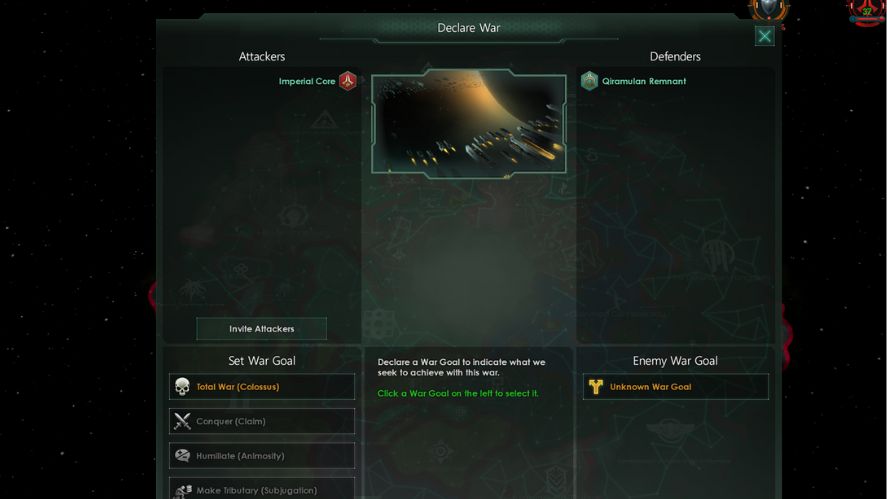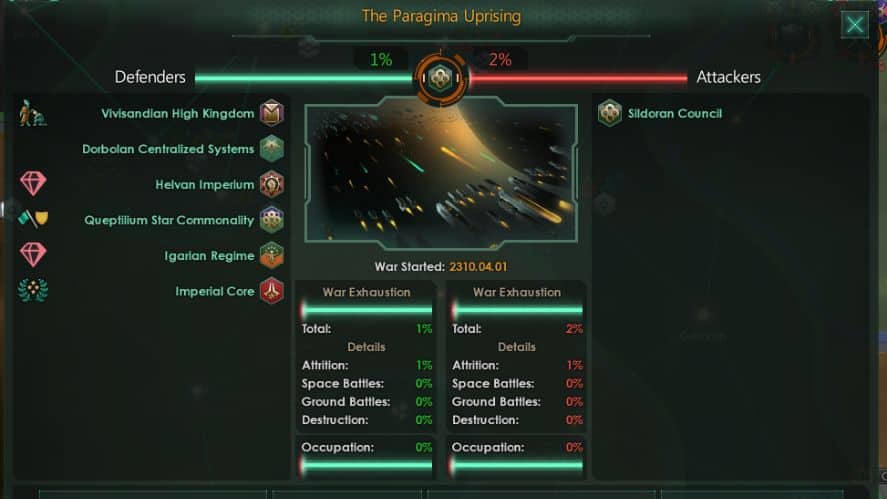Warfare is inevitable in Stellaris. Even if your empire are fanatic pacifists and are nice to every empire it meets; I guarantee you will find yourself at war at some point. The rules of war are ambiguous, and this guide aims to break through the murkiness to set your empire up for success.
Empires will fight wars for all kinds of reasons. Border disputes, to subjugate each other, raiding, and some seek the death of all life in the galaxy. Whatever the reason for the war, your empire should always be ready to defend itself.
Recommended Read: What Is Playing Tall in Stellaris and How to Do It
The rules for war may seem complicated at first glance, but let me assure you, it is actually quite simple. Wars will take place in three distinct phases. Phase one is declaration and setting war goals (Casus Belli). Phase two is; the fighting of the war. The final phase is conflict resolution, where victors claim their spoils and losers leave defeated.
A warfare guide for Stellaris can be summarized very succinctly in the following way; to fight wars, both parties declare a war goal, belligerents then engage in open conflict, and then the winner will claim their war goal, or the war will end in a status quo.
Table of Contents
Stellaris Warfare Guide
We have established the three phases of war already. Of course, the phases are a bit more complicated than that, but if you are ever confused about how warfare works, remembering these phases should steer you in the correct direction.
Each of these phases has its own unique game mechanics tied to them. Whilst knowledge of every tiny detail of these mechanics could be helpful, there is no need to memorize all of them.
If ever confused about a small detail, I recommend using the Stellaris wiki or any of the guides here on Gamer Empire to answer your questions.
The end game of Stellaris is all about war. You will likely be fighting multiple wars on multiple fronts, and your opponents will be very powerful. This is why a good knowledge of the warfare system is vital.
How to Declare War and Setting War Goals
It goes without saying that before a war can start, one of the parties has to declare war first.
Before you can declare a war, the persecutor needs a reason to go to war. The game refers to this reason as a Casus Belli.
Casus Belli is a Latin term that means case (Casus) of war (Belli). Essentially, it is a legal reason to go to war with another empire.
Having a Casus Belli grants access to a war goal. The side that forces a surrender will earn a reward based upon the war goal set at the beginning of the war.

For another empire to declare war on you, they will also need to comply with this system.
A defender has a year to declare their own war goal. The game will send you a message to remind you to do this, and I recommend that you do it because otherwise, a victory will gain you nothing.
Types of Casus Belli
There are over 50 different kinds of Casus Belli in Stellaris. As such, going through every single one of them is beyond the scope of this guide.
The Casus belli in the game come in three separate types, which will dictate the tone of the conflict going forward.
- Standard War Goals. These are the run-of-the-mill wars in Stellaris. Empires use these to expand territory, raid each other, humiliate one another, and spread their ideologies across the galaxy.
At the beginning of the game, you will find that these types of wars are the majority of what you will fight. The defender, in these wars, is free to pick a standard war goal they have access to, to claim if victorious.
- Subjugation War Goals. If an empire is much stronger than another, it may seek to vassalize a target instead of conquering it. If the attacker is victorious, the defeated empire becomes a vassal and enters into a vassal contract with the invader.
Not only for creating vassals, but these subjugation goals can also force other empires into the galactic imperium or to join you in becoming the crisis. In retaliation, defenders may set a standard war goal for themselves.
- Paired War Goals. These war goals are special cases. Whenever an empire declares one of these as its war goal, the defender does not get to set a war goal. The game makes them take the paired war goal. These wars can have long-reaching consequences. This type of war goal is the only way to declare total war on another. This type of war can only end in victory if one of the combatants is completely exterminated. It is also how subjects can break free of their oppressive masters.
Fighting the War
With war declared, it is time to get to the fun part; fighting the war. The gloves are off from this point on; any closed borders are now open, and your forces will engage in open combat.
A declaration of war could take you unaware. This is why I advise you to always have a strong military presence.
Once the war has started, a menu icon will appear in the top right-hand corner. It will have a picture of crossed swords or a shield and the warring empires’ flags.
Clicking on this tooltip will bring up the war menu, and this has all the information you could ever need to know about the current conflict.
On this screen, you will find info on; who is winning the war, all past engagements, both parties’ war exhaustion, losses accrued, the name of the war, and the options to end the current war. This menu is your friend. Get to know it well.

Winning the war is simple in concept but complicated in execution.
Essentially, you want to defeat your opponent in as many ship battles as you can, take over their systems, and conquer their planets. Of course, your opponent will be trying to do the same thing.
Tips to Win Wars
A speedy victory is, of course, the aim of any military action. The less fighting you do; the fewer losses you gain and ergo save resources on their replacement.
Victory isn’t always the aim. Sometimes you are trying to survive. I have collected a set of 10 tips to help you succeed in your next space war:
- Know your enemies. Your enemy may have called in some allies to fight alongside them. You can see this in the war menu. You should make note of where those other foes are, as they could attack you from an unexpected direction.
- Design your own ships. By default, the game will automatically generate ship designs for you. While this is fine for the first few decades of the game, if you are serious about winning wars, you will have to make your own ships. This process isn’t difficult and is a lot of fun. Go have a play with the ship design menu, and see what combos you can generate.
- Don’t be afraid to quit. Stellaris is famous for making a mess of your best-laid plans. You may be fighting border disputes in your northern border when all of a sudden the game slaps you with a crisis. If you can’t fight on two fronts, settle what disputes you can and focus on one threat at a time.
- Invade Planets. I have seen countless threads online, asking why their opponent isn’t surrendering, despite them conquering all of their systems. The answer is almost always that they forgot to invade their planets. Get some ground troops on those worlds ASAP, and the war will be over before you know it.
- Dig in and defend if you have to. In my experience, the game’s AI are cowards. They won’t declare war unless they are pretty confident they will win. This means they are likely to be a lot stronger than you. If this happens, taking the fight to them would be fool hardy. Use your star bases and fortress planets to slow them down. Do all you can to increase their war exhaustion, then force a status quo truce. Living to fight another day is always the best course of action.
- Assign Admirals and Generals. These leaders provide your armies and fleets with powerful buffs. They can even reduce their upkeep, saving you precious resources for future use.
- Watch Your Neighbours. When the AI plans to invade someone, they telegraph their intention by moving fleets closer to the border of their target. If your intel level is high enough, you will also receive an in-game warning that invasion is imminent. Watch your borders for fleets, and get ready for invasion, if it looks like they are mustering forces.
- Be aware of your war exhaustion. The more fighting you do, the less zeal there will be for your empire to continue fighting. When you get to 100 percent war score, the enemy will be able to force you into a status quo after 24 months. Bear in mind you can use this tactic yourself if you find yourself on the losing side.
- Bigger numbers mean victory. Every fleet in the game has a number assigned to them. This number is the fleet’s power level. This number is less important in PVP games, where players make fleets to counter one another. But in games against the AI, I would say 95 times out of 100; if your fleet power is bigger than theirs, you will win the engagement.
- Keep up in the arm’s race. Many of the research options you will come across are weapon upgrades for your ships. Better guns mean higher fleet power, and as we learned earlier, the fleet with bigger numbers often takes the win.
War Conclusion
It is inevitable that any war you are in will one day conclude. Warfare in Stellaris can only end in one of three ways.
Two of these options involve diplomacy, and the final way; concludes with the total annihilation of the loser.
The first method is one side in the conflict surrenders. This can be a voluntary surrender, or the attacker can force a surrender if the defender has no hope of victory.
Any claims the victor had, are immediately awarded, and any other rewards from the war goal are also bestowed. In many cases, the loser receives a penalty for defeat. A ten-year open border truce takes effect after the war.
A war can also end in a status quo. Otherwise known as a cease-fire. In this situation, both empires have accepted that there is nothing more to be gained from hostilities.
Both sides will take control of any claims they may have conquered. A ten-year open border truce takes effect as well.
The final method is for the genocidal empires out there. The war ends with one side and all their pops eliminated from the game.
If this happens to you, you will, of course, lose the game, as your empire is no more. The winner will gain all conquered territory.
Any unconquered territory that only contained a star base will become neutral and free to claim by building an outpost there.
Warfare is something you get better at with time. Don’t worry, though. You will be at war a lot, so you will have plenty of opportunities to practice.
This is everything you need to know about warfare in Stellaris.
If you have any questions or suggestions for this guide, please let us know in the comments section below. As always, have fun engaging in warfare in Stellaris.




